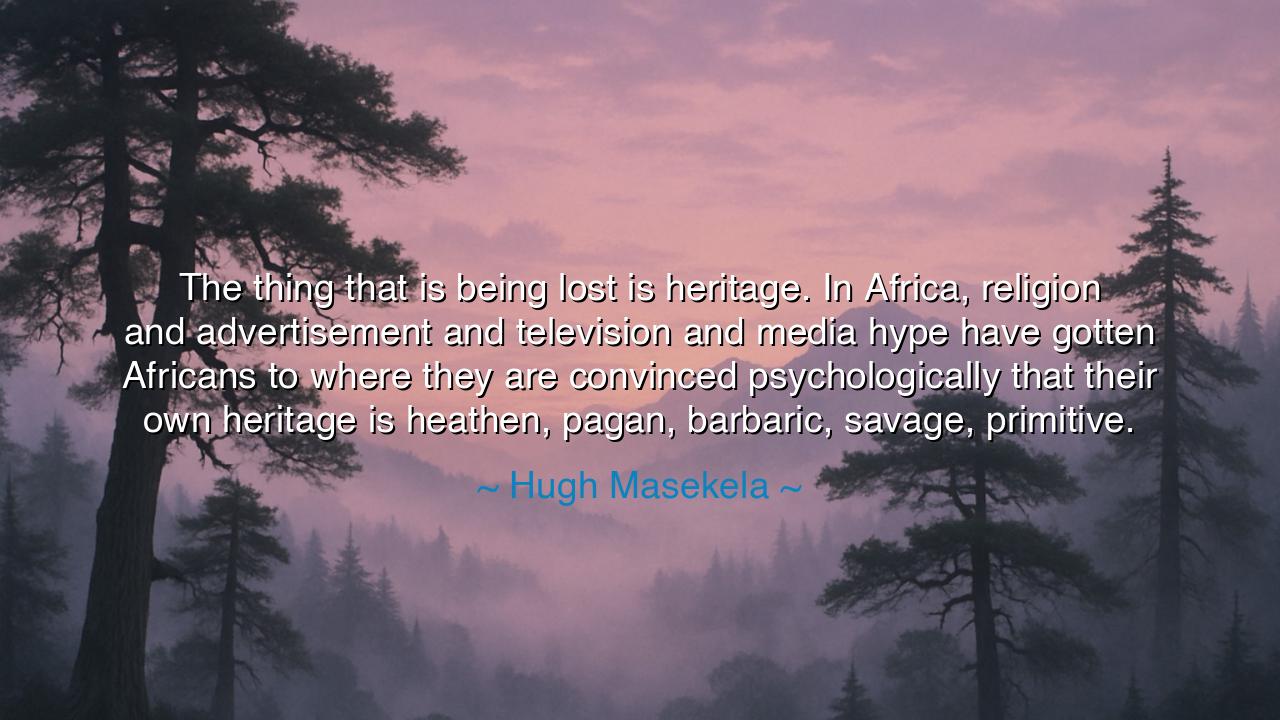
The thing that is being lost is heritage. In Africa, religion and
The thing that is being lost is heritage. In Africa, religion and advertisement and television and media hype have gotten Africans to where they are convinced psychologically that their own heritage is heathen, pagan, barbaric, savage, primitive.






"The thing that is being lost is heritage. In Africa, religion and advertisement and television and media hype have gotten Africans to where they are convinced psychologically that their own heritage is heathen, pagan, barbaric, savage, primitive." These words by Hugh Masekela ring out as a cry for the preservation of cultural heritage and a warning against the forces that seek to undermine the beauty and strength of ancestral traditions. In his statement, Masekela identifies a profound psychological crisis that has taken root in Africa—one that stems from the influence of religion, advertising, television, and the broader forces of media. These external influences have worked to devalue Africa’s own heritage, convincing its people that their traditions, their beliefs, and their way of life are primitive and inferior to the foreign ideals being presented to them.
In the ancient world, heritage was the cornerstone of every civilization. It was passed down from generation to generation, a sacred bond that connected individuals to their ancestors, to their land, and to their identity. The elders in a community were the keepers of knowledge, of wisdom, of the stories and rituals that formed the very essence of a people’s soul. These teachings were cherished and protected, for they were the foundation of a people’s purpose and belonging. But Masekela’s words tell us that this sacred heritage, this living tradition, is now under threat—lost to the modern world’s distractions.
Consider, for example, the colonial experience in Africa, where foreign powers imposed their own values, religions, and cultures upon the indigenous peoples, seeking to erase centuries of African wisdom. The arrival of Christianity and Islam in many African regions brought with it the notion that traditional African religions were barbaric and heathen. The ancient practices, the indigenous gods and spirits, were discarded in favor of foreign beliefs that seemed more civilized and righteous. This process of cultural erasure, of imposing foreign standards of morality and religion, created a rift between Africans and their own heritage, a rift that persists to this day.
The influence of advertising and media has only deepened this rift. The globalization of culture, facilitated by television, film, and social media, often presents an idealized image of the Western world—one of luxury, success, and modernity. These images, repeated constantly, have the power to convince people that their own lives, their own customs, and their own values are somehow inferior or backward. In many African nations, young people are exposed to images of the West that portray it as the ultimate standard of success. In contrast, their own heritage is portrayed as something to be escaped, something to be rejected in favor of modernity.
Take, for instance, the civil rights movement in the United States, where figures like Malcolm X and Marcus Garvey championed the importance of embracing one’s heritage. They rejected the dehumanizing labels imposed on African people by colonial and racist forces, and instead called for a proud embrace of African history, culture, and identity. For these leaders, heritage was not something to be ashamed of, but something to be celebrated and reclaimed. Their work was a call to self-respect, a call to look inward and find strength in the rich legacy of their ancestors.
The lesson here is clear: the loss of heritage is not simply the loss of tradition, but the loss of identity. To reject one’s heritage is to sever the deep, spiritual bond that connects an individual to their people, their land, and their history. It is to forget the wisdom passed down through the ages, the rituals that helped to shape the very character of a people. The modern world, with its advertisements, media, and foreign ideologies, often seeks to erase this bond in favor of globalization, but we must resist this force.
Let us then honor and embrace our heritage, whatever it may be. Let us pass down the wisdom of our ancestors, the stories that define us, and the practices that bind us together as a community. In doing so, we strengthen not only our individual identity, but the collective spirit of our people. We must reject the idea that to be modern means to abandon our traditions, and instead create a world where we can be both proud of our heritage and engaged with the future. The challenge is to celebrate who we are, to understand where we come from, and to use that knowledge to build a future that honors our past, rather than erasing it.
Thus, let us heed Masekela’s warning and hold fast to our heritage, for in doing so, we ensure that the legacy of our ancestors is not lost, but continues to guide and inspire us toward a more honorable and unified future. The richness of Africa's heritage—and of every culture's heritage—must be preserved as a beacon of strength, reminding us that our identity is not something to be ashamed of, but something to be celebrated and passed on to future generations. Let us stand firm in the face of cultural erasure, and reclaim our heritage with pride and honor.






AAdministratorAdministrator
Welcome, honored guests. Please leave a comment, we will respond soon